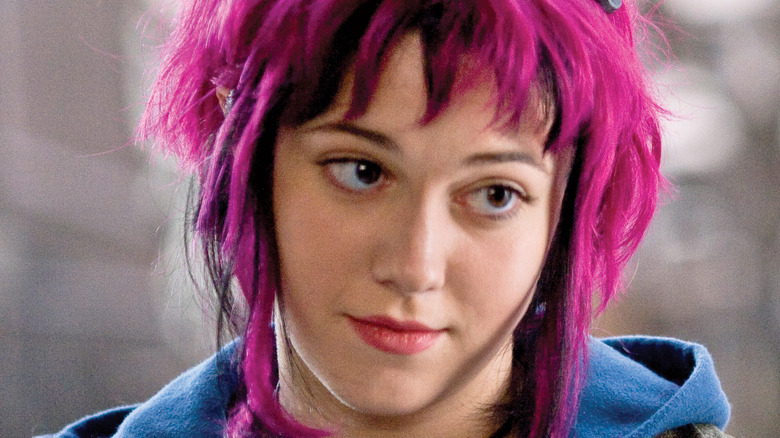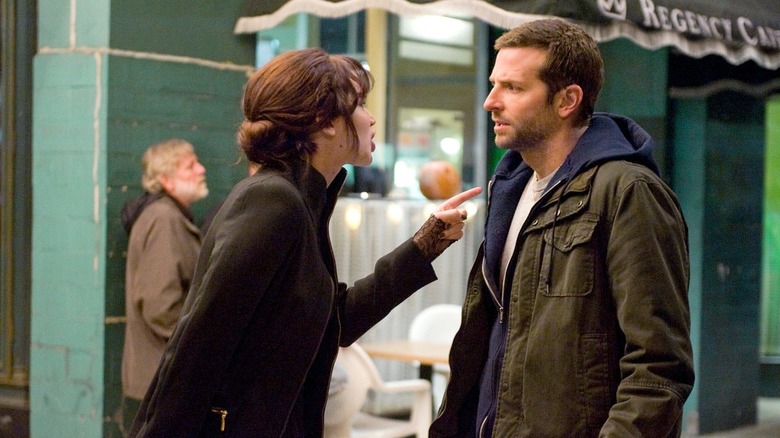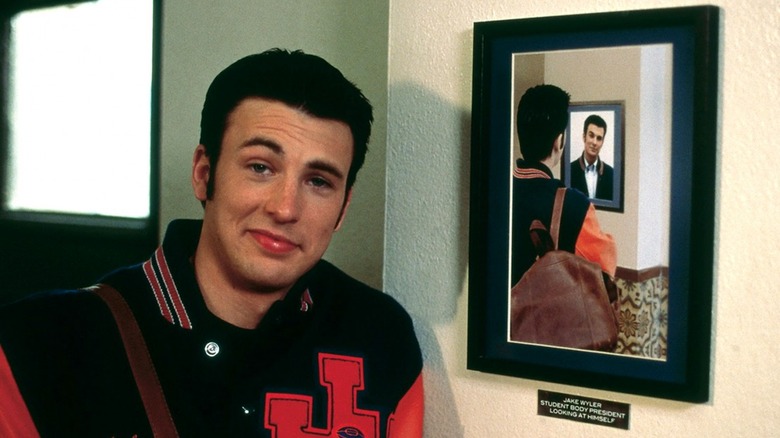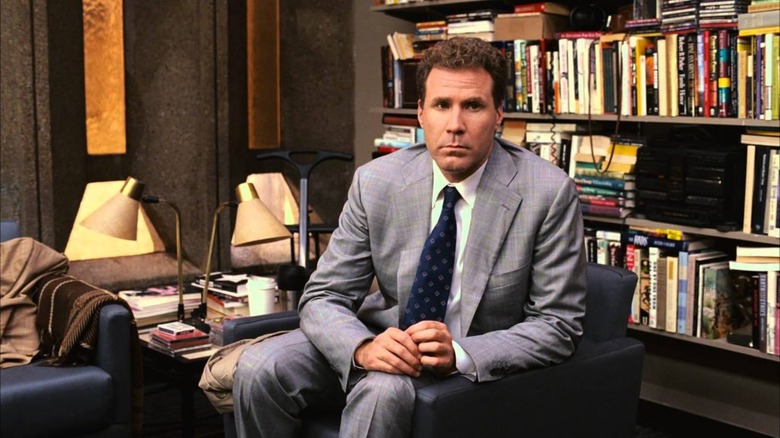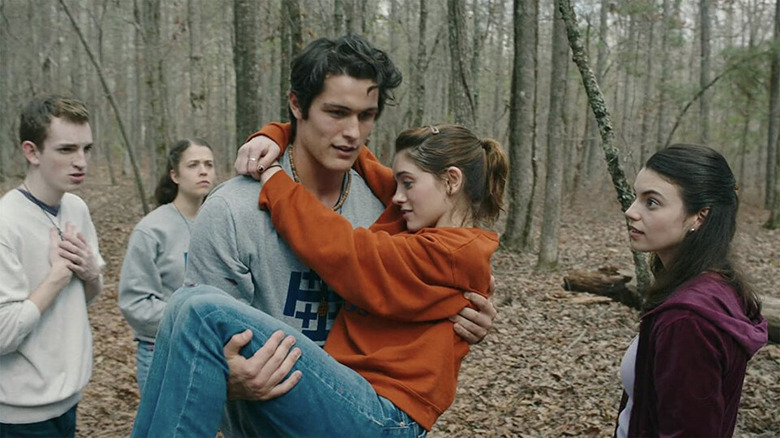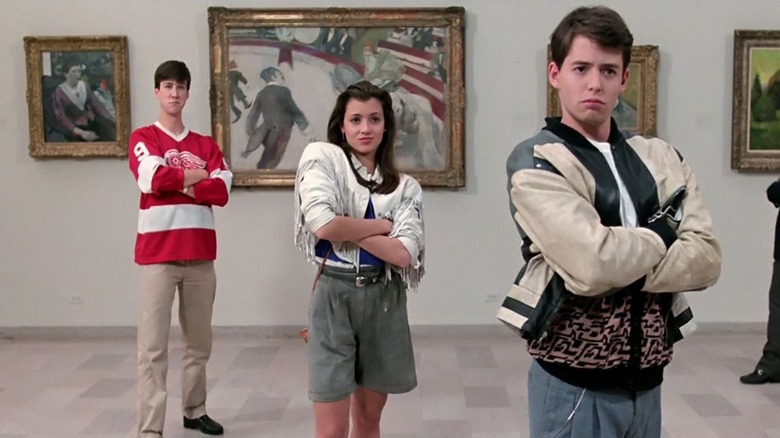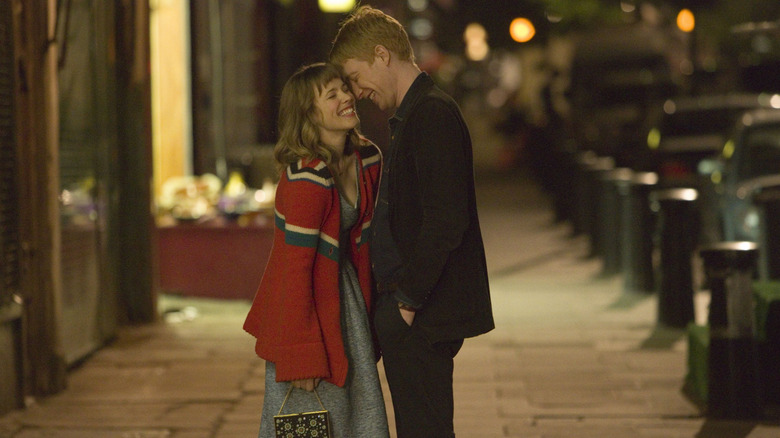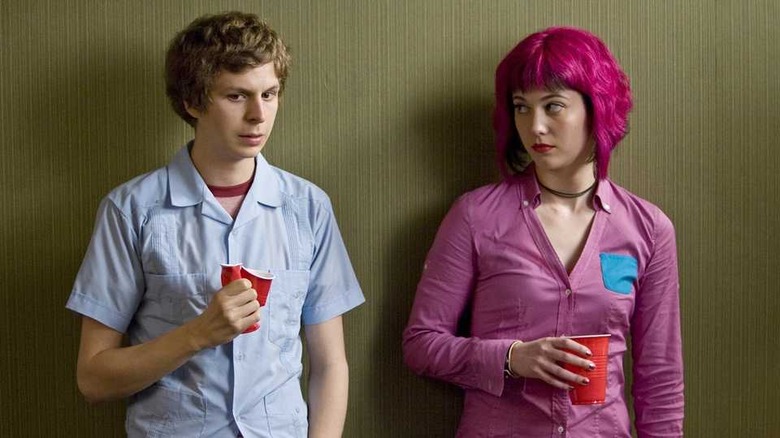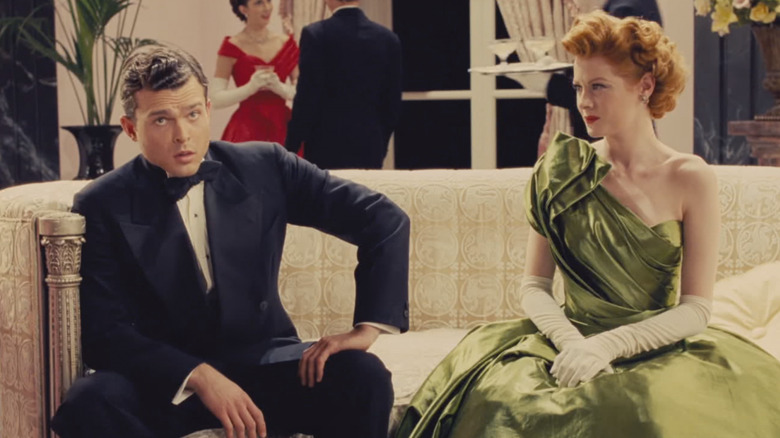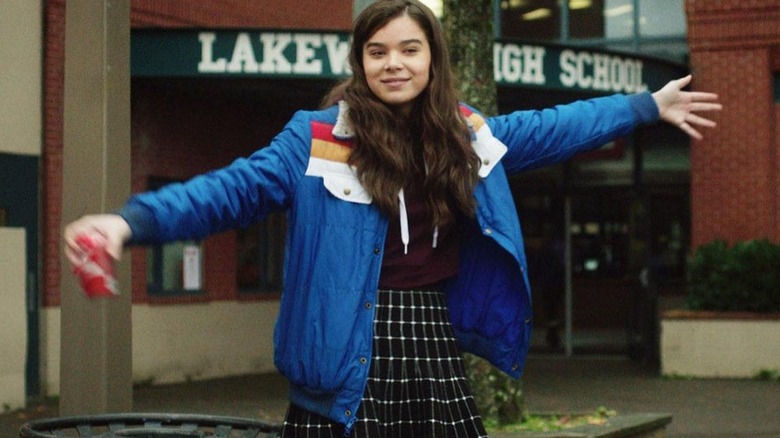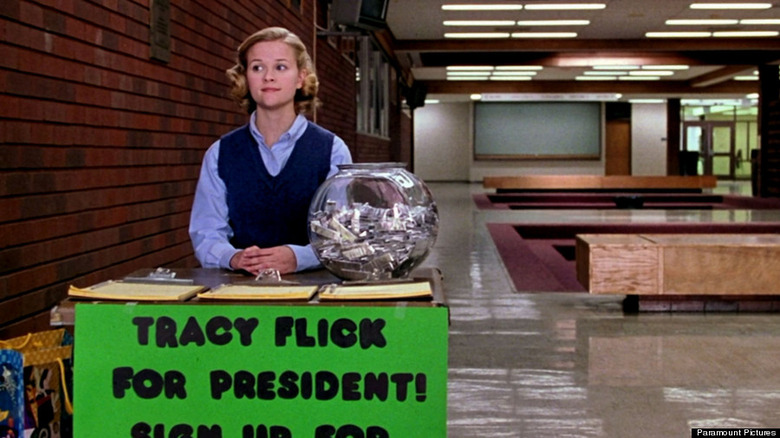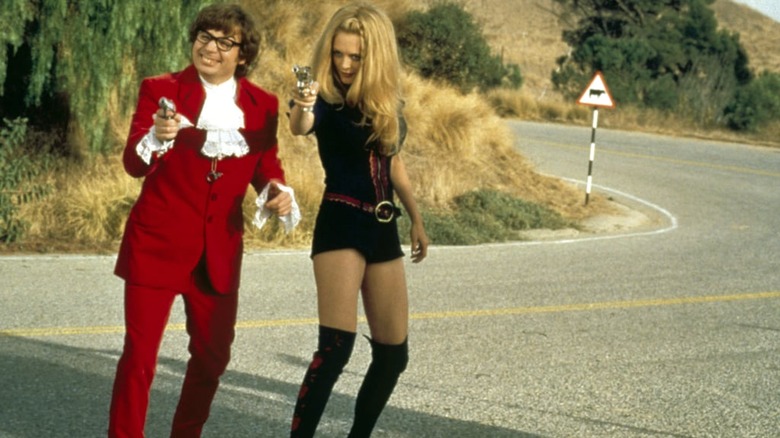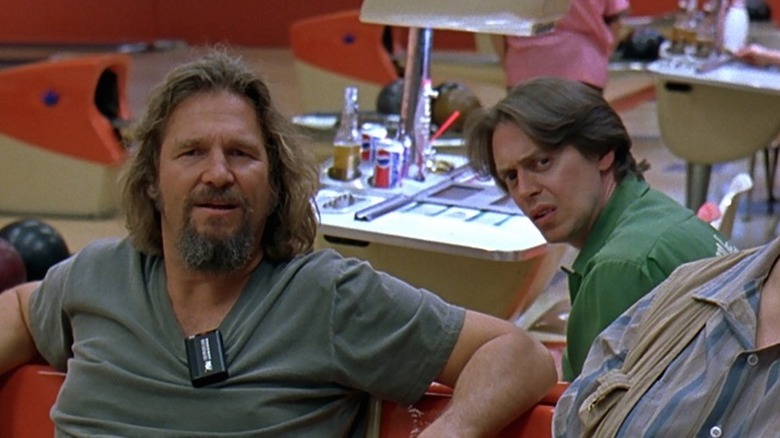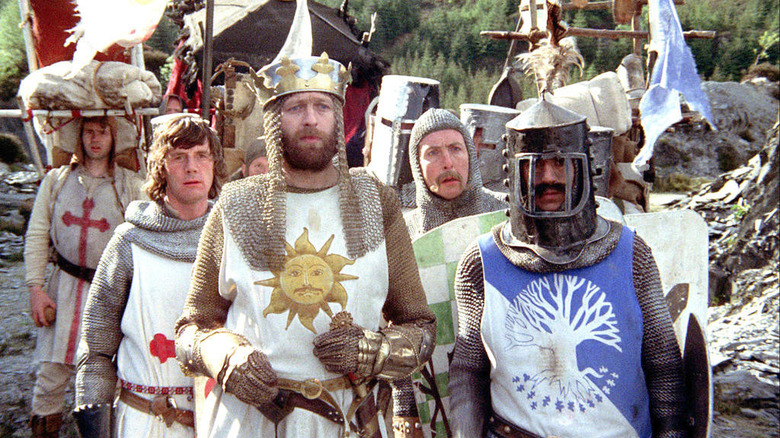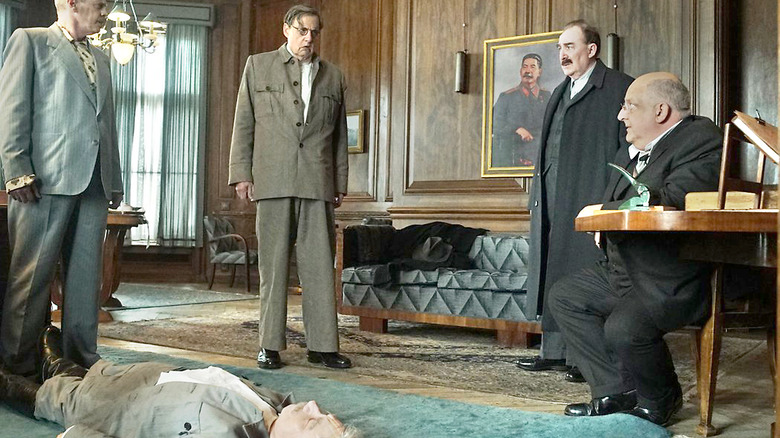The 14 Best Comedies You Can Watch On Netflix Right Now
There's room for criticism when it comes to the curation of Netflix's library. The popular streaming service seems to deny the existence of films released before 1970, for example, and as the company invests more and more money into original content, it has slowly begun to neglect other areas.
But not comedy. Other genres aren't particularly well represented on the service, but comedy is alive and well on Netflix, with a multitude of different subgenres at the viewer's fingertips. Brutal satires and pitch black comedies; teen sex farces and sweet and charming rom-coms; big blockbuster hits and quirky arthouse favorites — Netflix has plenty of options for those nights when you want to watch a movie, especially one that's going to let you shut your brain off and laugh. If you're looking for something funny on Netflix, the following 14 films are your best options.
Silver Linings Playbook
"Silver Linings Playbook" is a great choice if you're in the mood for some dark, subtle humor — although it is frequently funny, it doesn't hit you over the head with its comedy. Bradley Cooper stars as Pat, a former high-school English teacher who has just moved back into his parents' house after spending time in a psychiatric institution to help process the revelation that his wife was cheating on him. He's probably not a danger to himself or others, but the man seems perpetually one or two bad days away from losing it, and he's hyper-focused on showing improvement in the vain hopes that he will be able to win back his wife.
Friend-of-a-friend Tiffany (Jennifer Lawrence) reluctantly agrees to help Pat if he promises to enter a dance competition with her. Slowly, the trajectory of Pat's ultimate plans and their developing relationship changes. Cooper and Lawrence have great chemistry together, and put in performances that would get "Silver Linings Playbook" a Best Picture nomination at the Academy Awards, as well as a Best Actress Oscar for Jennifer Lawrence.
Not Another Teen Movie
The early '00s produced more raunchy genre parodies than anyone knew what to do with. The first "Scary Movie" is obviously the gold standard of these films (there are a lot of real stinkers), poking fun at teen slashers like "Scream," but "Not Another Teen Movie" does the same for the teen movies of the John Hughes variety, and gets a lot less credit.
That's a shame, because while it's a truly hodge-podge of a dozen different teen movies, "Not Another Teen Movie" manages to go for both the low-hanging fruit ("She's All That" features heavily) and some less obvious tropes (there's an entire subplot devoted to a guy who really wants to start a slow clap, but can't ever find the right moment). In a world of painfully bad parodies that clearly put the bare minimum of thought into what they're mocking, it's clear that "Not Another Teen Movie" has an affection for their source material. Also, it features a scene in which a young Chris Evans is clad only in whipped cream — we can all probably agree that's worth the price of admission alone.
Stranger Than Fiction
It's such a nice feeling when actors who got their start on "Saturday Night Live" get an opportunity to take their talents to indie movies with a more offbeat sense of humor. Will Ferrell is funny when he's completely over the top, but he's equally interesting to watch in subtler, more nuanced roles.
That's what we get in "Stranger Than Fiction." Here, Ferrell plays Harold Crick, an IRS auditor who is perfectly content to have each day look exactly like the one that came before it. But his expertly structured, well-regimented life changes when one day Harold wakes up to learn, to his surprise, that he can hear a voiceover narration that describes his every action. Is he losing his mind, or is he merely a character in someone else's story? "Stranger Than Fiction" is rarely laugh-out-loud funny, but it's incredibly charming as Harold, realizing that he may not be an actual person, finally gives himself permission to live.
Yes, God. Yes
In the entire pantheon of high school comedies, there are relatively few that address the unique awkwardness of growing up evangelical in the United States. In mainstream cinema, "Saved" is the only one that comes to mind. But then came Karen Maine's directorial debut "Yes, God, Yes," starring Natalia Dyer from "Stranger Things," and our prayers were answered.
A perpetually horny teenage girl, Dyer's Alice has to learn how to navigate her own sexual curiosity while simultaneously attempting to overcome the years of shame and guilt drilled into her by her church. But when one of Alice's anonymous AOL chats gets racy and is discovered by her pastor, a whole new level of stress is introduced. Will they find out it was her? Is the fear of getting caught enough to stop her from giving in to temptation again?
"Yes, God, Yes" captures the overwhelming experience of high school bible retreats, filled with teenagers so sexually repressed they're all about to explode if they so much as accidentally touch hands. Predictably, hilarity ensues.
Ferris Bueller's Day Off
When it comes to '80s high school comedies, "Ferris Bueller's Day Off" is pretty much iconic. It's the ultimate on-screen wish fulfillment: What kid didn't dream about skipping school, running off to have wild adventures with friends, and facing absolutely zero repercussions? Matthew Broderick wins hearts and minds immediately as Ferris Bueller — beginning with his very first direct address to the camera, Ferris lets the audience in on his scam. We become willing co-conspirators.
This is a star-making performance for Broderick, who exhibits the kind of charisma that is utterly essential for this type of movie. If the audience thought that Ferris was smug or manipulative, the film wouldn't work. But because of Broderick, we buy into his whole schtick: all of the last-minute shenanigans and quick escapes, as well as his seemingly genuine belief that putting his anxiety-ridden buddy Cameron (Alan Ruck) through the ringer is helping him. And look, if you say that you weren't incredibly impressed by Ferris' intricate system for staying home sick, well, you're probably lying.
About Time
"About Time" is one of the more gentle comedies on this list. In fact, it's often pretty sad. When Tim (Domhnall Gleeson) turns 21, his father lets him in on the family secret: All the men in their family have the ability to travel to specific points in their own timeline. All they have to do is go to a dark place, close their eyes, and think about where they want to travel. And boom! There they are.
At first, Tim uses his powers for purely selfish reasons, trying to get a do-over after royally screwing up an encounter with a girl he's interested in. But as the years go by, Tim learns how to use his powers in a way that enriches his life without holding it hostage. "About Time" is a genuinely sweet, good-natured film completely reliant on the relationship between Tim and his loving father (played by Bill Nighy). Silly rom-com hijinks give way to moments of genuine poignancy, as Tim learns that there are limits to what his abilities can do, especially once he has a child — traveling back in time to before her birth puts her entire existence at risk. Director and writer Richard Curtis has always known how to make sentimental romances, and "About Time" is perhaps one of his very best.
8. Scott Pilgrim vs the World
"Scott Pilgrim vs. the World" is a wildly imaginative action comedy that embodies the spirit of a graphic novel better than most Marvel or DC fare. It stars Michael Cera as Scott Pilgrim, a young slacker who falls hard for Ramona Flowers (Mary Elizabeth Winstead), a manic pixie dream girl with great hair. There's only one catch: Before Scott can get the girl, he has to defeat every single one of her seven evil exes, a task that becomes increasingly more challenging the closer he gets to accomplishing his goal.
Director Edgar Wright creates a vivid, heightened version of reality in which Ramona's emotional barriers and Scott's deep-seated insecurities combine to create villains that feel more like video game bosses than actual flesh-and-blood humans. "Scott Pilgrim vs. the World" didn't make a tremendous impact when it was first released, but it has since undergone a serious reappraisal, and is respected both for its creativity and the fact that it served as a launching pad for the careers of actors like Brie Larson, Chris Evans, and Aubrey Plaza.
Hail, Caesar!
There are precisely six words that make "Hail, Caesar!" one of the Coen brothers' most unexpectedly funny films: "Would that it were so simple." Set during Hollywood's Golden Age, "Hail, Caesar!" revolves around a taciturn and mysterious man, Eddie Mannix (Josh Brolin), who works as a fixer for all the major studios. When a pretty young starlet ends up in the family way without a ring on her finger, Mannix is there to do damage control. When a handsome but empty-headed actor inadvertently gets caught up in a communist ring, Mannix handles things.
The old studio system required a slavish devotion to the carefully constructed personas developed for the studio's stars, and even the smallest step out of line could cause serious problems. Although other Coen brothers films are better regarded, "Hail, Caesar!" stands out for its incredible ensemble cast. Arguably no directors have better understood how to use Channing Tatum's unique talents to the fullest — and if nothing else, the Coens are responsible for bringing us the cowboy Hobie Doyle, played by Alden Ehrenreich in one of his first major roles.
The Edge of Seventeen
When we look at the history of teen comedies, it is shocking how many of them revolve around teenage boys. Even the ones that highlight teen girls don't really seem to understand them or take them seriously. As such, "The Edge of Seventeen" is striking in that it shows us how much we've been missing — it's a (somewhat) raunchy teen comedy whose hero is just a horny, hyper-relatable 16-year-old girl named Nadine (Hailee Steinfeld, just a few short years after her Oscar-nominated performance in "True Grit").
Nadine has never been particularly great at connecting with people, and when her only friend (Haley Lu Richardson) starts dating Nadine's brother, Nadine goes a little haywire. "The Edge of Seventeen" brings to life all of the agonizing, cringe-inducing parts of being a teenager, but it never makes Nadine the butt of the joke. Funny, moving, and unusually well-acted, "The Edge of Seventeen" picks up the baton that "Easy A" carried for years and runs with it.
Election
When you watch "Election," a film released relatively early in Reese Witherspoon's career, you begin to realize how few directors have ever used her effectively. On the surface, Witherspoon is a bubbly blonde, intelligent in her own way but generally more interested in embodying the role of the cinematic social butterfly. But, when pressed, Witherspoon can go so far beyond that stereotype, and her performance in "Election" is proof.
In the film, Witherspoon plays Tracy Flick, a hyper-ambitious, Machiavellian high school student who is determined to become student body president by any means necessary. The darkness of the storyline (and there are parts where it gets pretty grim, especially the relationship between Tracy and the school's social studies teacher, played by Matthew Broderick) contrasts sharply with the light touch of Witherspoon's performance, all of which helps to make "Election" a biting satire of high school politics for the ages.
Austin Powers: The Spy Who Shagged Me
Realistically, the entire "Austin Powers" franchise could be on this list. As parodies of goofy, misogynistic spy thrillers, each one is clever and well-executed. Because they're thoroughly rooted in crude humor and cheap gags, they've never quite gotten the credit they deserve, but when you watch the "Austin Powers" movies two full decades after their initial release, they hold up surprisingly well (although that impression is no doubt aided by the warm glow of '90s nostalgia).
While they all have their merits, "Austin Powers: The Spy Who Shagged Me" is the best of the bunch. No longer saddled with the gorgeous but supremely unfunny Elizabeth Hurley, Austin pairs up with Heather Graham, who seems to actually understand the assignment. Where the first film saw Austin as a fish out of water, "The Spy Who Shagged Me" sends him back to the swinging '60s to recover the mojo that Dr. Evil stole from his cryogenically frozen body. Add Fat Bastard, yet another character played by Mike Myers, and Seth Green as the petulant son of Dr. Evil, and you have a surefire hit on your hands.
The Big Lebowski
Come on, you guys. It's "The Big Lebowski." You might not have seen it, but you definitely know it.
One of the Coen brothers' most beloved films (and for the Coens, a pair of filmmakers who don't have many stinkers on their filmography, that's saying something), "The Big Lebowski" stars Jeff Bridges as the Dude, an almost preternaturally laidback bowler who gets caught up in a case of mistaken identity when he is beaten up by some hoods looking for money owed to them by a different Jeffrey Lebowski. The Dude takes the beating in stride, but he can't forgive the criminals for defiling his rug, the one piece of décor that really pulled the whole room together.
Sadly for our beleaguered hero, this is only the beginning of his problems. "The Big Lebowski" is another comedy that people love to quote, and it's not hard to see why; aside from Jeff Bridges, who creates one of the most iconic characters of the '90s, "The Big Lebowski" also happens to be a deceptively well-written film.
Monty Python and the Holy Grail
There are probably not hard numbers on this sort of thing, but "Monty Python and the Holy Grail" may very well be the single most quoted comedy of all time. If 10 of you were to go quiz your dads on their favorite movies, nine of you would find this quirky Arthurian parody pretty high on the list.
That's the lasting impact of "Monty Python and the Holy Grail." Lovingly assembled by the Monty Python comedy troupe (and famously bankrolled by some of the most beloved musicians of the day, including Led Zeppelin, Pink Floyd, and Jethro Tull, who stepped in when studios wouldn't touch it), "Monty Python and the Holy Grail" explores many of King Arthur's legendary adventures — sort of. In a lot of ways, the film captures the aimlessness of Arthurian mythology in a way that few other films are able to; the truth is, the Knights of the Round Table really just wander around looking for scrapes to get into.
We're not even going to try to list the highlights of the film, because the entire screenplay would just end up here. Suffice it to say, it's all good, and everyone should watch it.
The Death of Stalin
Born from the same satirical mind that brought us "Veep," "The Death of Stalin" is a farcical masterpiece directed by Armando Iannucci, a man who somehow intuitively understands the inherent ridiculousness of politics and power. After Stalin, the leader who ruled the Soviet Union with an iron fist in the years following World War II, suddenly dies, the various cronies and career bureaucrats who surrounded him are thrown into a tailspin. No one wants to take responsibility for anything, yet everyone wants to make themselves look as good as possible.
Stalin's potential successors stand around his dead body for ages, unsure of what to do, years of bureaucratic work stifling their ability to act without circumventing the chain of command. While feigning a deep sense of grief and the appropriate level of solemnity, each of Stalin's devoted counselors quickly and quietly lays the groundwork for a power grab. Their constant backstabbing is a pure delight, as is the tangled, often incoherent political world of shaky alliances and perceived slights that "The Death of Stalin" builds.
